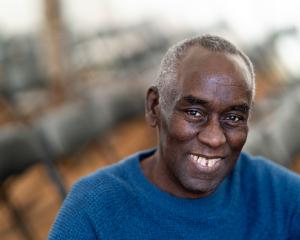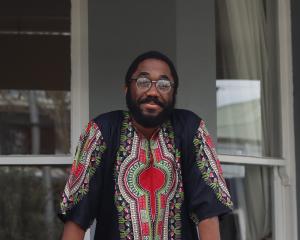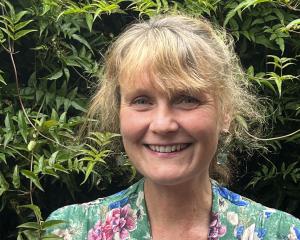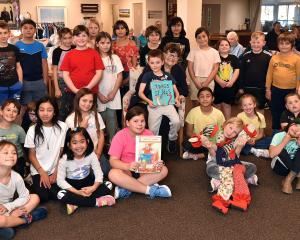Ken Follett is talking beyond his allotted time. I know this because a representative from Follett's New Zealand publishing company, aware the author has a pressing dinner engagement elsewhere, is pacing beyond the glass doors of a meeting room deep within a particularly swanky Queenstown hotel.
It's a place where expensive bottles of wine are stacked in a cabinet spanning an entire wall. Although Follett has reportedly popped more than a few magnums of Champagne to mark the launch of a new book over the years, he chuckles when it is pointed out these bottles are under lock and key - their contents allowed to mellow a little more.
Follett likes to think his product will also stand the test of time, while expressly promoting it for immediate consumption.
Indeed here he is, plugging his latest work, Fall of Giants, visiting a country hardly essential to his ongoing success and agreeable to an interview that - well, let's face it - could be regarded as equally superfluous to his career. Yet that's the point: Follett is committed to his work.
And it's big business. Having sold more than 100 million copies of his books, Follett is a rich man. Forbes magazine's list of the world's 10 wealthiest authors puts his annual earnings at 10.6 million. Although at No 8 and well back from Harry Potter author J.K. Rowling's 160 million yearly take, Follett can still boast a statue in Spain (hand on chin, he is depicted in a thoughtful pose) and houses in Britain, South Africa and the Caribbean.
"I always wanted to write stories that would enchant millions of people. And part of that process involves letting people know a book is out there," Follett says, leaning forward in his chair in a manner that, if he weren't so enthusiastic, would be almost conspiratorial.
"How we really sell books is by someone reading it, putting it down and saying to their best friend, 'you've got to read this great book'. But you've got to kick-start that process," he says, smiling.
"When I started I had a period of no success and I never forget that. I remember how I used to wish that people like you wanted to interview me about my new book. You don't forget that, if you are sensible. You don't get too high and mighty about it."
As if to prove his point, Follett is more than happy to sign a couple of titles that have been plucked from a box belonging to my wife's book club (one member in particular is a big fan). One is 1986 spy thriller Lie Down With Lions; more significantly, the other is 1989 epic The Pillars of the Earth.
It's not the only writing he's been doing on a worldwide promotional tour that began in August. Fall of Giants, which details the lurch to World War 1, the Russian Revolution and the British suffragette movement, is the first in his Century trilogy. Follett is already on to the next; again likely to eclipse 800 pages, it will focus on the Great Depression, the Spanish Civil War and World War 2.
"I've got a long book to write," he says. "Actually, I don't find it that bad. I open the laptop and I get lost in the imaginary world ... The airport lounge sort of disappears."
A recent article in British newspaper The Observer lamented what it said was a growing trend for tombstone-heavy books. Certainly, Follett's most popular works include those that are also his biggest. He says some fans have asked him to go well beyond the 806-page, 400,000-word Pillars which, with a plot centred on the construction of a cathedral in 12th-century England, signalled a dramatic switch from his line of popular spy thrillers.
"Some say they wish it was longer. I think also, in a longer book, you see a character develop from, say, childhood to adulthood, or from maturity to old age and that's very satisfying to the reader. They enjoy that process, that rhythm of human life," Follett says.
"A regular-sized novel, about 100,000 words, is a snapshot of the characters at some point in their lives, usually at a time of great crisis. Usually, the story takes place over a few days or weeks or months, maybe a year or two, but it doesn't give you that biography factor."
There is nothing accidental about Follett's writing career.
Born in Cardiff, on June 5, 1949, the first of three children to Martin and Veenie Follett, deeply religious parents who did not permit television, cinema or radio, the young Follett instead derived his entertainment from stories told to him by his mother or regular visits to the local library.
Follett's upbringing filters into Fall of Giants via the characters of a Welsh mining family, in particular Billy Williams who, as he matures, begins to ask the "big questions".
"There is a lot of my childhood in Billy's childhood," Follett agrees. "My family weren't political at all, but they were very religious, in the same way Billy's parents are religious - that rather puritan, dogmatic way. The arguments Billy has with his father about religion are similar to those I had with my father."
At the age of 10, Follett moved to London with his family, finishing school then studying philosophy at University College. He also learned some life lessons: his girlfriend Mary fell pregnant; the couple married at the end of Follett's first term at university; and their son, Emanuele, was born in July, 1968.
In 1970, a three-month graduate journalism course further charted Follett's path to writing. He began as a reporter for the South Wales Echo in Cardiff, then, following the birth of daughter Marie-Claire in 1973, as a columnist for London's Evening News.
However, having not made the grade as a "hot-shot investigative reporter", he began writing fiction in his spare time and by 1974 had exited journalism and joined a small London publisher.
Follett published several books around that time, using various pseudonyms, but none did particularly well. Then came Eye of the Needle, the 1978 spy thriller that thrust him on to the best-seller lists, earned him an Edgar Award from the Mystery Writers of America the following year and has since sold more than 10 million copies.
It also allowed him to quit his job and focus on writing the important follow-up Triple. Ultimately, it also gave him both the financial freedom and artistic confidence to roam later in his career.
"In those nine years between writing Eye of The Needle and beginning Pillars of the Earth, I acquired a lot of skills," Follett explains. "I was writing five days a week, 48 weeks a year ... It is like being a sportsman: after you have played in a team for a few years, you are tougher and more savvy.
"The other thing is I never really felt boxed in by my previous successes. I never thought because I had written thrillers I had to continue to do so. That's partly because of the age I was.
"I started writing Pillars of the Earth at the beginning of 1986 so I was 36. As you get older I think you get more cautious. If I had thought about it later, I might have hesitated to go out on a limb like that. As a young man, I think you feel you're entitled to try anything."
A hallmark of Follett's enduring success is his attention to detail. Those who have read Pillars, its sequel World Without End or his latest effort might suggest research is a recurring character. As Follett commented in a 2007 USA Today article, research provides the "grain of everyday life".
Although it also gives him a framework for plot turns both small and large - a device he uses every four or five pages ("It is a good rule . . .") - all that intensive homework would read rather dryly if it weren't bound with insights into the human condition; our frailties, strengths, desires and motivations.
"You have to engage a reader's emotions," the 61-year-old urges. "Even though the readers know this is fictional, they care about these people."
Follett might not mind reading "flowery" prose by others, but he likes his own words to be transparent. He describes his style as "chiefly, no style at all". When friend Hanif Kureishi, author of My Beautiful Laundrette, once commented that he didn't consider his readers when writing, Follett's reply was, "That's why you are a great writer and I am a rich writer."
He is constantly thinking about simplifying his sentences, structuring his ideas in the right order, to avoid readers having to revisit a line or two. He believes that is no small key to his popularity.
"I get a lot of younger readers and foreign readers and I think that is partly because my prose is easy to understand. I sell a lot of books in European countries where English is spoken."
Read Fall Of Giants and it quickly becomes apparent Follett is well-versed in the cut, thrust and whisper of politics.
Drawn into anti-Vietnam protests while a student in the late '60s, Follett became involved with fundraising and campaigning for the Labour Party in the early 1980s. It was then that he met the party's local branch secretary, Barbara Broer, whom he married in 1985.
They now live in Hertfordshire, near London, sometimes sharing their home (they have another in London) with Ken's son and daughter, Barbara's son and two daughters and their partners and children.
The couple were key figures in the set known as "Champagne socialists" and "Labour luvvies", helping raise millions for the "new" Labour movement which brought Tony Blair to power in 1997. Says Follett: "Our friends for the past 15 years have been those running the country, so I have a very good sense of how they work".
A member of Parliament for Stevenage, a seat she won in 1997 and to which she was returned in the 2001 and 2005 elections, Barbara held various portfolios, including social equality and tourism, until this year's election in May, when Labour was deposed by a Conservative-Liberal Democrat coalition.
In May 2009, the couple made headlines as part of the MPs' expenses scandal, The Daily Telegraph revealing Barbara had claimed 25,000 for private security patrols around her London home.
Asked whether such attention had any effect on either his writing career or his domestic life, Follett barely pauses.
"Briefly, the MPs' allowances were never enough to cover their costs. I was subsidising Barbara to the tune of about 100,000 a year. Regarding the expenses, there were rules which we gave to the accountant and said, 'apply for what we are entitled to; it will be nowhere near what we are spending'.
"We were entitled, for example, to claim a portion of our security costs. Barbara has had deaths threats - I never have - so we have security patrols twice a night and we claimed a quarter of the cost of that as a political expense.
"Then we read the front pages ... about why should taxpayers be paying for Ken Follett's security? The answer is because there are very nutty people out there.
"It was massively irritating to be accused to be on the take. On the other hand, Barbara and I went into this together. We both wanted her to be an MP and work for the Labour Party. We are not kids. We knew it would be like this. As far as it having an effect on our married life, it was zero."
Having retired from politics ("She didn't stand in the election - she would have lost anyway"), Barbara is now chief executive of Follett's publishing business, which employs 16 people.
"I don't have time to run it. It has always been a bit haphazard but Barbara has always had an interest in it. Now she has the time to do it properly."
The move also allows Follett more time to concentrate on other pursuits, including his passion for music.
A budding guitarist (his website lists several rather expensive acoustic models), he plays bass in a couple of bands, including a blues ensemble featuring his 42-year-old son, Emanuele.
"It's terrific. Playing music together is a great thing to do as a father and son. He is much better than me, which is quite a good thing, because through your childhood Dad is God; he does everything well. But you get to your teens and you get a bit fed up with that," Follett says, his chuckle now verging on cackle. "He is so much more of a virtuoso guitarist than I've ever been."
Still, writing remains Follett's first love.
"I engage with this work totally. It requires all the brains I have got, all my general knowledge, my capacity to read and study and learn and whatever I have learned about human beings in my 61 years - which I concede is not a great amount.
"It isn't about being driven in the sense there is no desperation about it; it is just the most interesting thing in my life."
Ken Follett interview transcipt
Follett: A selection
• The Modigliani Scandal (1976)
• Paper Money (1977)
• Eye of the Needle (1978)
• Triple (1979)
• The Key to Rebecca (1980)
• The Man from St Petersburg (1982)
• On Wings of Eagles (1983)
• Lie Down with Lions (1986)
• The Pillars of the Earth (1989)
• Night Over Water (1991)
• A Dangerous Fortune (1993)
• A Place called Freedom (1995)
• The Third Twin (1996)
• The Hammer of Eden (1998)
• Code to Zero (2000)
• Jackdaws (2001)
• Hornet Flight (2002)
• Whiteout (2004)
• World Without End (2007)
• Fall of Giants (2010)












